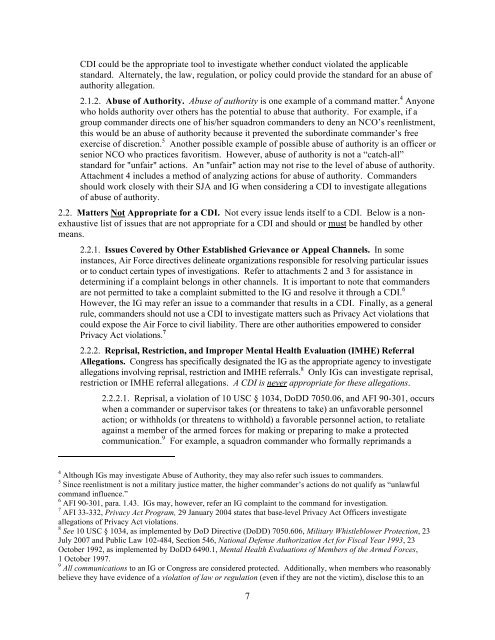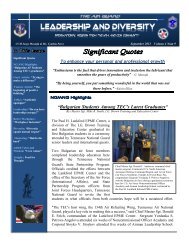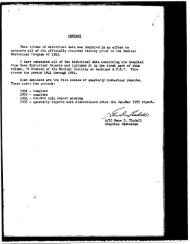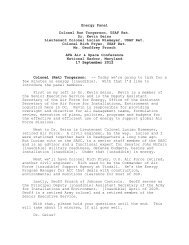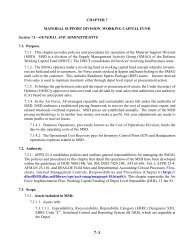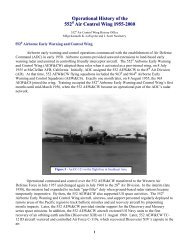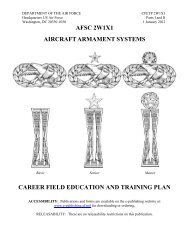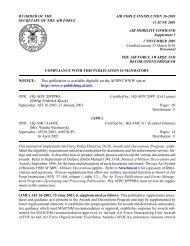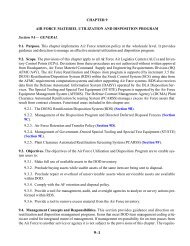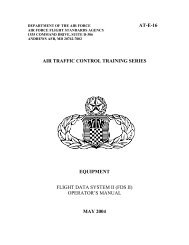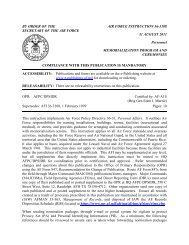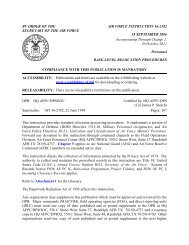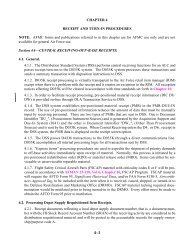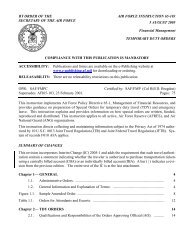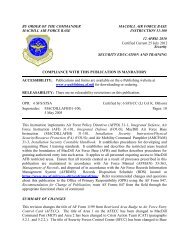Commander-Directed Investigation (CDI) Guide - Air Force Link
Commander-Directed Investigation (CDI) Guide - Air Force Link
Commander-Directed Investigation (CDI) Guide - Air Force Link
Create successful ePaper yourself
Turn your PDF publications into a flip-book with our unique Google optimized e-Paper software.
<strong>CDI</strong> could be the appropriate tool to investigate whether conduct violated the applicable<br />
standard. Alternately, the law, regulation, or policy could provide the standard for an abuse of<br />
authority allegation.<br />
2.1.2. Abuse of Authority. Abuse of authority is one example of a command matter. 4 Anyone<br />
who holds authority over others has the potential to abuse that authority. For example, if a<br />
group commander directs one of his/her squadron commanders to deny an NCO’s reenlistment,<br />
this would be an abuse of authority because it prevented the subordinate commander’s free<br />
exercise of discretion. 5 Another possible example of possible abuse of authority is an officer or<br />
senior NCO who practices favoritism. However, abuse of authority is not a “catch-all”<br />
standard for "unfair" actions. An "unfair" action may not rise to the level of abuse of authority.<br />
Attachment 4 includes a method of analyzing actions for abuse of authority. <strong>Commander</strong>s<br />
should work closely with their SJA and IG when considering a <strong>CDI</strong> to investigate allegations<br />
of abuse of authority.<br />
2.2. Matters Not Appropriate for a <strong>CDI</strong>. Not every issue lends itself to a <strong>CDI</strong>. Below is a nonexhaustive<br />
list of issues that are not appropriate for a <strong>CDI</strong> and should or must be handled by other<br />
means.<br />
2.2.1. Issues Covered by Other Established Grievance or Appeal Channels. In some<br />
instances, <strong>Air</strong> <strong>Force</strong> directives delineate organizations responsible for resolving particular issues<br />
or to conduct certain types of investigations. Refer to attachments 2 and 3 for assistance in<br />
determining if a complaint belongs in other channels. It is important to note that commanders<br />
are not permitted to take a complaint submitted to the IG and resolve it through a <strong>CDI</strong>. 6<br />
However, the IG may refer an issue to a commander that results in a <strong>CDI</strong>. Finally, as a general<br />
rule, commanders should not use a <strong>CDI</strong> to investigate matters such as Privacy Act violations that<br />
could expose the <strong>Air</strong> <strong>Force</strong> to civil liability. There are other authorities empowered to consider<br />
Privacy Act violations. 7<br />
2.2.2. Reprisal, Restriction, and Improper Mental Health Evaluation (IMHE) Referral<br />
Allegations. Congress has specifically designated the IG as the appropriate agency to investigate<br />
allegations involving reprisal, restriction and IMHE referrals. 8 Only IGs can investigate reprisal,<br />
restriction or IMHE referral allegations. A <strong>CDI</strong> is never appropriate for these allegations.<br />
2.2.2.1. Reprisal, a violation of 10 USC § 1034, DoDD 7050.06, and AFI 90-301, occurs<br />
when a commander or supervisor takes (or threatens to take) an unfavorable personnel<br />
action; or withholds (or threatens to withhold) a favorable personnel action, to retaliate<br />
against a member of the armed forces for making or preparing to make a protected<br />
communication. 9 For example, a squadron commander who formally reprimands a<br />
4 Although IGs may investigate Abuse of Authority, they may also refer such issues to commanders.<br />
5 Since reenlistment is not a military justice matter, the higher commander’s actions do not qualify as “unlawful<br />
command influence.”<br />
6 AFI 90-301, para. 1.43. IGs may, however, refer an IG complaint to the command for investigation.<br />
7 AFI 33-332, Privacy Act Program, 29 January 2004 states that base-level Privacy Act Officers investigate<br />
allegations of Privacy Act violations.<br />
8 See 10 USC § 1034, as implemented by DoD Directive (DoDD) 7050.606, Military Whistleblower Protection, 23<br />
July 2007 and Public Law 102-484, Section 546, National Defense Authorization Act for Fiscal Year 1993, 23<br />
October 1992, as implemented by DoDD 6490.1, Mental Health Evaluations of Members of the Armed <strong>Force</strong>s,<br />
1 October 1997.<br />
9 All communications to an IG or Congress are considered protected. Additionally, when members who reasonably<br />
believe they have evidence of a violation of law or regulation (even if they are not the victim), disclose this to an<br />
7


